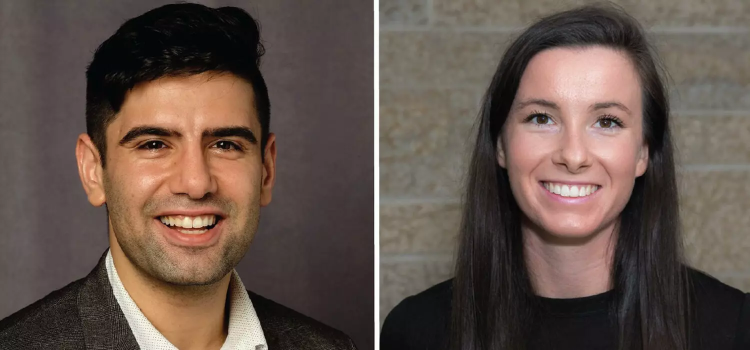At first glance, addiction recovery and advanced-materials science may seem worlds apart.
But the latest recipients of the Izaak Walton Killam Doctoral Scholarship at the University of Calgary share a goal: building stronger, more resilient systems whether that means supporting individuals through recovery or improving the technologies that drive energy, aerospace and space exploration.

From left: Anees Bahji and Brooke Richtik
Dr. Anees Bahji, MD, a PhD candidate in community health sciences at the Cumming School of Medicine, and Brooke Richtik, a Faculty of Science PhD candidate in chemistry, are each tackling complex challenges with broad implications for society.
As 2024 Killam Scholars, their research is recognized not only for academic excellence, but for the potential to create meaningful, lasting impact.
Exposing the blind spots in addiction research
Bahji's research confronts one of the most overlooked and misunderstood public health issues in Canada: cannabis use disorder (CUD).
While cannabis use is now legalized in Canada, Bahji says its risks are frequently minimized, even as some users face serious health consequences.
"CUD (is) a condition that exists, but (one) that most people either don't know about or don't believe in," he says. "It's a diagnosable addiction that affects up to one in three regular cannabis users, and yet it's often dismissed as a joke or a myth. I've seen it strain relationships, disrupt education, destabilize mental health and make recovery feel impossible."
CUD is on the rise in Canada, yet there are still no medications currently approved by Health Canada. In addition, there are few formal clinical guidelines, limited training protocols and almost no co-ordinated data infrastructure.
Bahji's research aims to fill these gaps and help build a system of care for people living with the disorder.
His doctoral research involves building a "population-based laboratory for cannabis-related harms" by analyzing large-scale provincial and national health and survey datasets, including efforts to validate a case definition for CUD.
Through this, Bahji is working to identify how cannabis addiction is diagnosed, how it interacts with other psychiatric conditions like depression or anxiety, and how it plays out across different communities.
He also applies machine learning to improve diagnosis accuracy and studies how stigma and health inequities influence outcomes.
"At its core, my research is about helping systems see what they've been trained to overlook," Bahji says. "It's about making invisible suffering visible and doing something about it."
He says the Killam scholarship has been transformative not just financially, but emotionally.
"When I found out I had received the Killam, it felt like a quiet but powerful moment of affirmation," Bahji says. "Like someone had seen me. And not just the outputs the papers, the data but the intention, the heart, the persistence behind it."
For Bahji, the scholarship validates a kind of work that is often difficult and emotionally charged, but deeply necessary. It allows him to pursue community-based collaborations and long-term fieldwork while staying grounded in what drives him: improving outcomes for people too often ignored by the system.
Engineering the future of high-temperature materials
Richtik's work focuses on materials that could change how we power, monitor and maintain critical technologies from jet engines to space missions.
Her research focuses on a special type of material called piezoelectrics that produce electricity when squeezed and can also move when electricity is applied.
This makes them ideal for use in things like sensors (which detect changes in pressure or vibration) and actuators (which create movement using electrical signals). However, most piezoelectric materials stop working properly at high temperatures typically above 300°C limiting their usefulness in harsh environments such as power plants, aircraft engines and outer space.
Richtik is helping in the development and recognition of a new material that can handle temperatures as high as 650°C, while still performing well.
"My research focuses on understanding the structure-property relationships of a novel piezoelectric material capable of operating at high temperatures," she says.
To do this, Richtik studies the material at the atomic level using advanced tools like X-ray and neutron diffraction. These tools allow her to observe how the atoms inside the material shift and respond when exposed to heat, pressure or electric fields much like taking numerous microscopic snapshots to see exactly how each part moves.
Understanding these atomic movements is key, she says: "These insights are critical for understanding the mechanisms behind the material's performance."
By learning how the material behaves, Richtik can identify ways to improve it, such as changing its chemical makeup to make it even more efficient or durable.
Receiving the scholarship has been a major boost, both in reaffirming her commitment to her research, and as validation.
"It really helped me build my confidence in research and reminded me that the work I'm doing matters and that I can do hard things," Richtik says.
The award has also allowed her to share her research at international conferences, build collaborations and explore new research directions. Ultimately, her work supports Canada's goals for cleaner energy, safer infrastructure and advanced space technologies with the potential to make future systems more sustainable and reliable.
It's a powerful example of how fundamental science, grounded in curiosity and precision, can help solve some of the world's most complex challenges.
The Izaak Walton Killam Doctoral Scholarship supports outstanding graduate students in developing advanced research at the University of Calgary. UCalgary hosted as special event in October 2024 to recognize our exceptional faculty and post- and predoctoral 2024 Killam Laureates.
Anees Bahji, MD, is a psychiatrist and clinical assistant professor in the Department of Psychiatry at the Cumming School of Medicine. He is also a PhD candidate in community health sciences.










